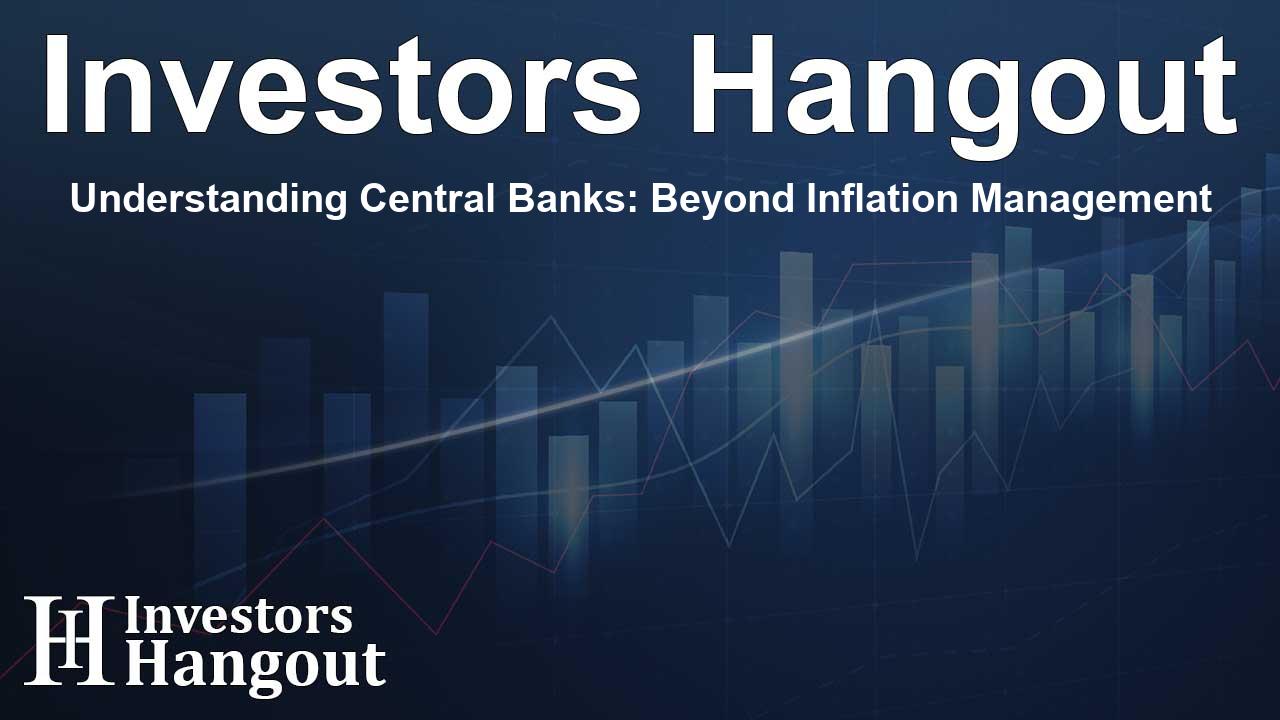Understanding Central Banks: Beyond Inflation Management

Central Banks and Their Evolving Role
The post-COVID-19 landscape has presented central banks with a series of unprecedented challenges. Inflation, which has surged to levels not observed in decades, has placed central banks under considerable scrutiny. Yet, is inflation the sole question on their agenda?
Inflation—A Significant, But Not Sole, Factor
Central banks rely heavily on data to guide their actions, taking into account various economic indicators. While inflation remains a focal point, analysts from Morgan Stanley suggest that it is not the only element influencing central bank strategies. As inflation cools following the pandemic's peak, decisions regarding interest rates must consider a wider array of data.
The Complexity of Current Economic Indicators
In recent reports, inflation has shown signs of deceleration. However, the accompanying data has been inconsistent. For instance, monthly payroll statistics in the U.S. have not provided a clear picture, leading to uncertainty for central bankers who must navigate these murky waters.
Balancing Act: Inflation and Economic Growth
Central banks are tasked with a delicate balance: managing inflation while fostering economic growth. While consumer spending in the U.S. remains strong—contributing positively to GDP growth—the implications of a rising U.S. dollar create added complexity. This is especially true in light of differing monetary policies across the globe.
Exchange Rates and Their Influence
The effects of a stronger dollar are multifaceted. For example, it has bolstered currencies like the euro and the yen, complicating the dynamics of inflation and economic growth. In June 2024, the European Central Bank's (ECB) decision to adjust rates reflected this ongoing tension as officials sought to navigate a path forward amidst sluggish economic growth.
Globally Divergent Policies Affecting Inflation
The interplay between foreign exchange rates and inflationary pressures is a significant concern for central bankers. Notably, in August 2024, the euro appreciated against the dollar owing to varying expectations from central banks, which temporarily helped manage inflation. Nonetheless, if there is a sharp increase in the dollar's value, it may result in higher import costs, subsequently leading to imported inflation—especially in Europe.
Wage Dynamics: A Critical Component
An essential aspect of inflation management relates to labor market dynamics. Wage growth trends are paramount when considering future inflationary scenarios. In the Eurozone, where wage increases have been modest, concerns have emerged about consumer expenditure and economic growth. A downturn in wage growth could signal easing inflation, but it also brings apprehensions about spending levels.
The Future of Monetary Policy
As central banks look to the future, they must navigate this complex landscape of inflation, economic growth, and wage dynamics. Policies that prioritize inflation control may inadvertently stall growth and vice versa. There remains a critical need for policymakers to develop strategies that address both inflationary pressures and enhance overall economic stability.
Frequently Asked Questions
What primary challenge do central banks face today?
Central banks today grapple with balancing inflation control and promoting economic growth amid shifting economic indicators.
How does the U.S. dollar's strength impact global economies?
A stronger dollar can drive up import costs, leading to imported inflation and affecting trade balance in other economies.
What role do wages play in inflation management?
Wage growth significantly influences consumer spending and inflation outcomes; softer wage growth may reduce inflationary pressures but also stall economic growth.
Are inflation rates indicating a long-term trend?
While recent trends show easing inflation, the volatility in data means central banks must exercise caution in predicting future trends.
How do central banks use data to make decisions?
Central banks analyze a variety of economic indicators to guide monetary policy, focusing on inflation as well as growth and employment figures.
About Investors Hangout
Investors Hangout is a leading online stock forum for financial discussion and learning, offering a wide range of free tools and resources. It draws in traders of all levels, who exchange market knowledge, investigate trading tactics, and keep an eye on industry developments in real time. Featuring financial articles, stock message boards, quotes, charts, company profiles, and live news updates. Through cooperative learning and a wealth of informational resources, it helps users from novices creating their first portfolios to experts honing their techniques. Join Investors Hangout today: https://investorshangout.com/
Disclaimer: The content of this article is solely for general informational purposes only; it does not represent legal, financial, or investment advice. Investors Hangout does not offer financial advice; the author is not a licensed financial advisor. Consult a qualified advisor before making any financial or investment decisions based on this article. The author's interpretation of publicly available data shapes the opinions presented here; as a result, they should not be taken as advice to purchase, sell, or hold any securities mentioned or any other investments. The author does not guarantee the accuracy, completeness, or timeliness of any material, providing it "as is." Information and market conditions may change; past performance is not indicative of future outcomes. If any of the material offered here is inaccurate, please contact us for corrections.